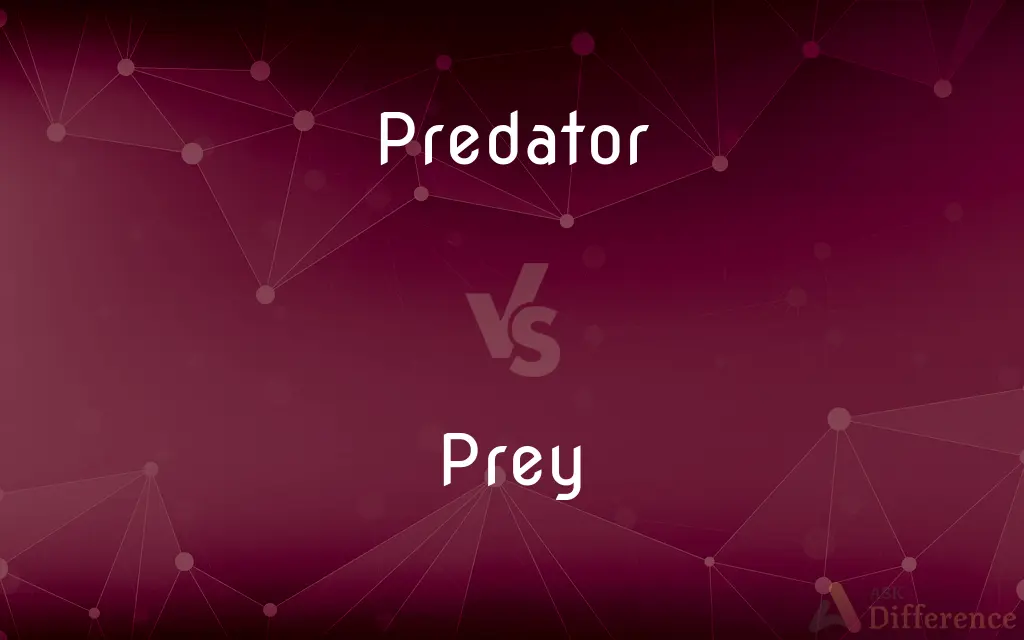Predator vs. Prey — What's the Difference?
By Tayyaba Rehman & Fiza Rafique — Updated on March 19, 2024
Predators actively hunt for food, while prey are organisms hunted as food.

Difference Between Predator and Prey
Table of Contents
ADVERTISEMENT
Key Differences
Predators are organisms that hunt and kill other animals for food. They have adaptations like sharp teeth, claws, and keen senses to help them catch their prey. Whereas prey are the organisms that predators hunt for food. They have evolved various survival strategies such as camouflage, speed, and defensive mechanisms to avoid predators.
Predators play a crucial role in maintaining the balance of ecosystems by controlling the population of prey species. On the other hand, the abundance and behavior of prey species can influence the population and distribution of predators.
In many ecosystems, the relationship between predator and prey is dynamic and can lead to evolutionary changes in both. Prey species might develop better defenses over time, while predators may evolve more effective hunting strategies.
Predators often occupy higher trophic levels in food chains, indicating their role as consumers of other animals. Prey, however, are typically found at lower trophic levels, serving as food for predators and sometimes as consumers of plants or smaller animals.
The interaction between predator and prey is a fundamental aspect of ecology, shaping the behavior, population dynamics, and evolutionary paths of both. This interaction is not only vital for the individual species but also for the health and stability of their ecosystems.
ADVERTISEMENT
Comparison Chart
Role in Food Chain
Consumers, typically at higher levels
Consumed, usually at lower levels
Survival Strategies
Hunting, stalking, ambushing
Camouflage, fleeing, forming groups
Adaptations
Sharp teeth, claws, keen senses
Speed, defensive mechanisms, camouflage
Impact on Ecosystem
Control prey population, maintain balance
Influence predator populations, biodiversity
Evolutionary Impact
Develop hunting strategies
Develop defenses against predators
Compare with Definitions
Predator
A predator is an organism that hunts and kills other animals for food.
A lion, a classic example of a predator, stalks its prey before launching a surprise attack.
Prey
Prey are organisms that are hunted and eaten by predators.
Rabbits are common prey for a variety of predators, including hawks and foxes.
Predator
Predators have physical and behavioral adaptations for hunting.
Owls have sharp talons and exceptional night vision to hunt in the dark.
Prey
Many prey animals have developed keen senses to detect predators early.
Gazelles have large eyes on the sides of their heads, allowing them to see approaching predators.
Predator
Predators help control the population of other species, maintaining ecological balance.
Wolves regulate deer populations, preventing overgrazing in forest ecosystems.
Prey
Prey species are a vital link in transferring energy across trophic levels.
Phytoplankton serve as the foundational prey in marine food webs, supporting a wide range of marine life.
Predator
Common examples include lions, eagles, and sharks.
Great white sharks, apex predators, play a crucial role in marine ecosystems.
Prey
Prey species have evolved various strategies to avoid being eaten.
Zebras have stripes that confuse predators during a chase.
Predator
Predators often employ specific strategies like stalking or ambushing to catch their prey.
The cheetah uses incredible speed to outrun its prey in the open savannah.
Prey
Examples of prey include mice, krill, and grasshoppers.
Krill are a major source of food for whales, seals, and other marine predators.
Predator
An organism that lives by preying on other organisms.
Prey
An animal hunted or caught by another for food
The leopard carried its prey into a tree.
Predator
A person or group that robs, victimizes, or exploits others for gain.
Prey
The collection of animals typically hunted and eaten by a predator
The acoustic location of prey by barn owls.
Predator
Someone who attacks and plunders for gain.
Prey
An object or victim of attack
Ships that became the prey of pirates.
Predator
Someone who attacks in search of booty
Prey
One that is subjected to or afflicted with something
Was prey to depression.
Predator
Any animal that lives by preying on other animals
Prey
One that is deceived or taken advantage of by another
Easy prey for swindlers.
Prey
The act or practice of preying.
Prey
Plunder; booty.
Prey
To hunt, catch, or eat as prey
Owls prey on mice.
Prey
To victimize or make a profit at someone else's expense
Swindlers who prey upon the weak.
Prey
To plunder or pillage
Vikings preying on coastal settlements.
Prey
To exert a baneful or injurious effect
Remorse preyed on his mind.
Prey
(archaic) Anything, such as goods, etc., taken or got by violence; something taken by force from an enemy in war
Prey
That which is or may be seized by animals or birds to be devoured
Prey
A person or thing given up as a victim.
Prey
A living thing that is eaten by another living thing.
The rabbit was eaten by the coyote, so the rabbit is the coyote's prey.
Prey
(archaic) The act of devouring other creatures; ravage.
Prey
The victim of a disease.
Prey
(intransitive) To act as a predator.
Prey
Anything, as goods, etc., taken or got by violence; anything taken by force from an enemy in war; spoil; booty; plunder.
And they brought the captives, and the prey, and the spoil, unto Moses, and Eleazar the priest.
Prey
That which is or may be seized by animals or birds to be devoured; hence, a person given up as a victim.
The old lion perisheth for lack of prey.
Already sees herself the monster's prey.
Prey
The act of devouring other creatures; ravage.
Hog in sloth, fox in stealth, . . . lion in prey.
Prey
To take booty; to gather spoil; to ravage; to take food by violence.
More pity that the eagle should be mewed,While kites and buzzards prey at liberty.
Prey
A person who is the aim of an attack (especially a victim of ridicule or exploitation) by some hostile person or influence;
He fell prey to muggers
Everyone was fair game
The target of a manhunt
Prey
Animal hunted or caught for food
Prey
Profit from in an exploitatory manner;
He feeds on her insecurity
Prey
Prey on or hunt for;
These mammals predate certain eggs
Common Curiosities
Can an animal be both predator and prey?
Yes, many animals are both, depending on the context; for example, a bird may prey on insects but be prey for a cat.
Why are predators important in ecosystems?
They maintain the balance by controlling prey populations and preventing overgrazing or overpopulation.
How do prey defend themselves?
Prey use strategies like camouflage, speed, and forming groups to escape predators.
What adaptations do predators have?
Predators have adaptations such as sharp claws, teeth, and enhanced senses for hunting.
How does the predator-prey relationship affect evolution?
This dynamic relationship drives evolutionary adaptations in both predators and prey.
What is an apex predator?
An apex predator is at the top of the food chain and has no natural predators.
Do predators always catch their prey?
No, prey often escape due to their own survival strategies and the element of chance.
How do prey animals avoid predators?
Prey animals have evolved features like camouflage and heightened senses to detect and escape predators.
What role do humans play as predators?
Humans are apex predators, impacting ecosystems through hunting, fishing, and altering habitats.
How do predators select their prey?
Predators may choose based on size, age, health, and ease of capture.
How do prey populations recover from predation?
Prey populations can rebound through reproductive strategies and migration to safer areas.
What is the predator-prey cycle?
The predator-prey cycle refers to the oscillating numbers of predator and prey populations over time.
What is a keystone predator?
A keystone predator has a disproportionately large impact on its environment relative to its abundance.
Can plants be considered prey?
Yes, in the context of herbivory where animals feed on plants, plants can be considered prey.
Share Your Discovery

Previous Comparison
C vs. Java
Next Comparison
Leveraged vs. UnleveragedAuthor Spotlight
Written by
Tayyaba RehmanTayyaba Rehman is a distinguished writer, currently serving as a primary contributor to askdifference.com. As a researcher in semantics and etymology, Tayyaba's passion for the complexity of languages and their distinctions has found a perfect home on the platform. Tayyaba delves into the intricacies of language, distinguishing between commonly confused words and phrases, thereby providing clarity for readers worldwide.
Co-written by
Fiza RafiqueFiza Rafique is a skilled content writer at AskDifference.com, where she meticulously refines and enhances written pieces. Drawing from her vast editorial expertise, Fiza ensures clarity, accuracy, and precision in every article. Passionate about language, she continually seeks to elevate the quality of content for readers worldwide.
















































